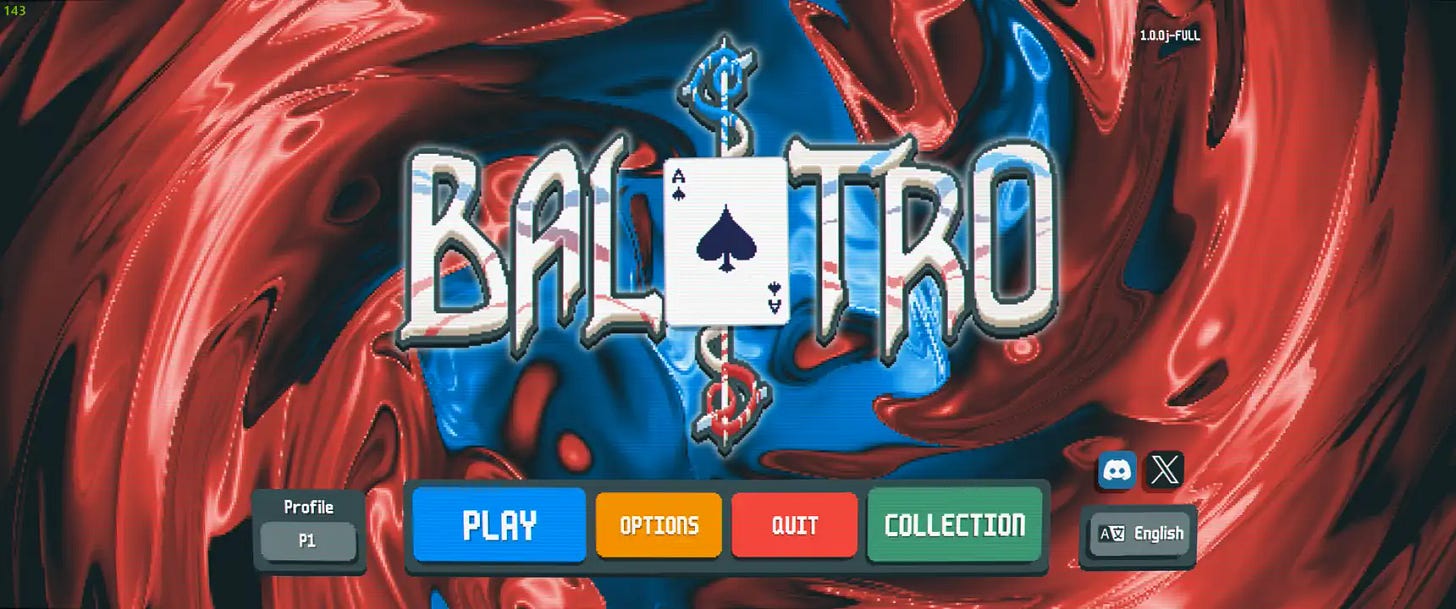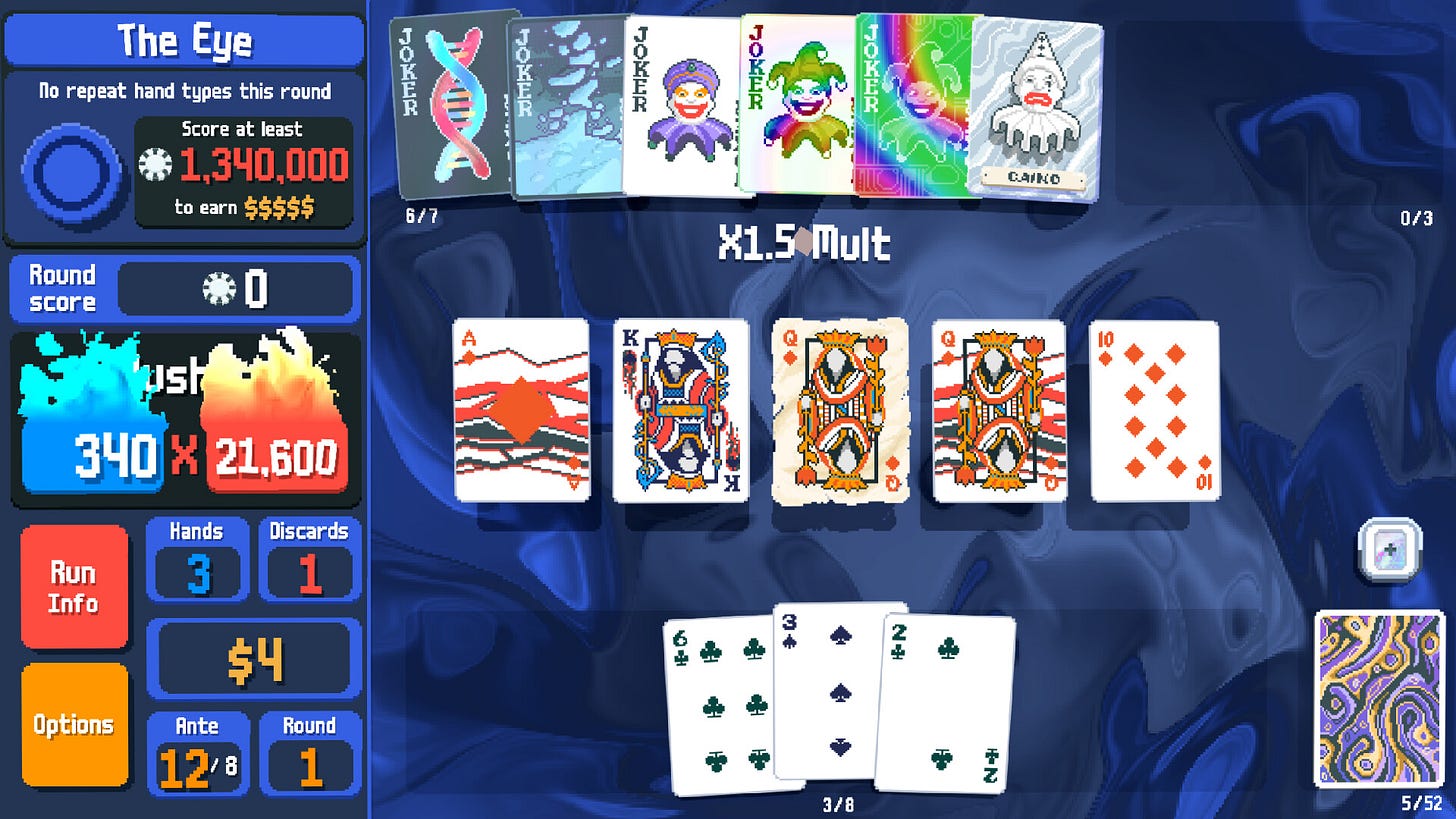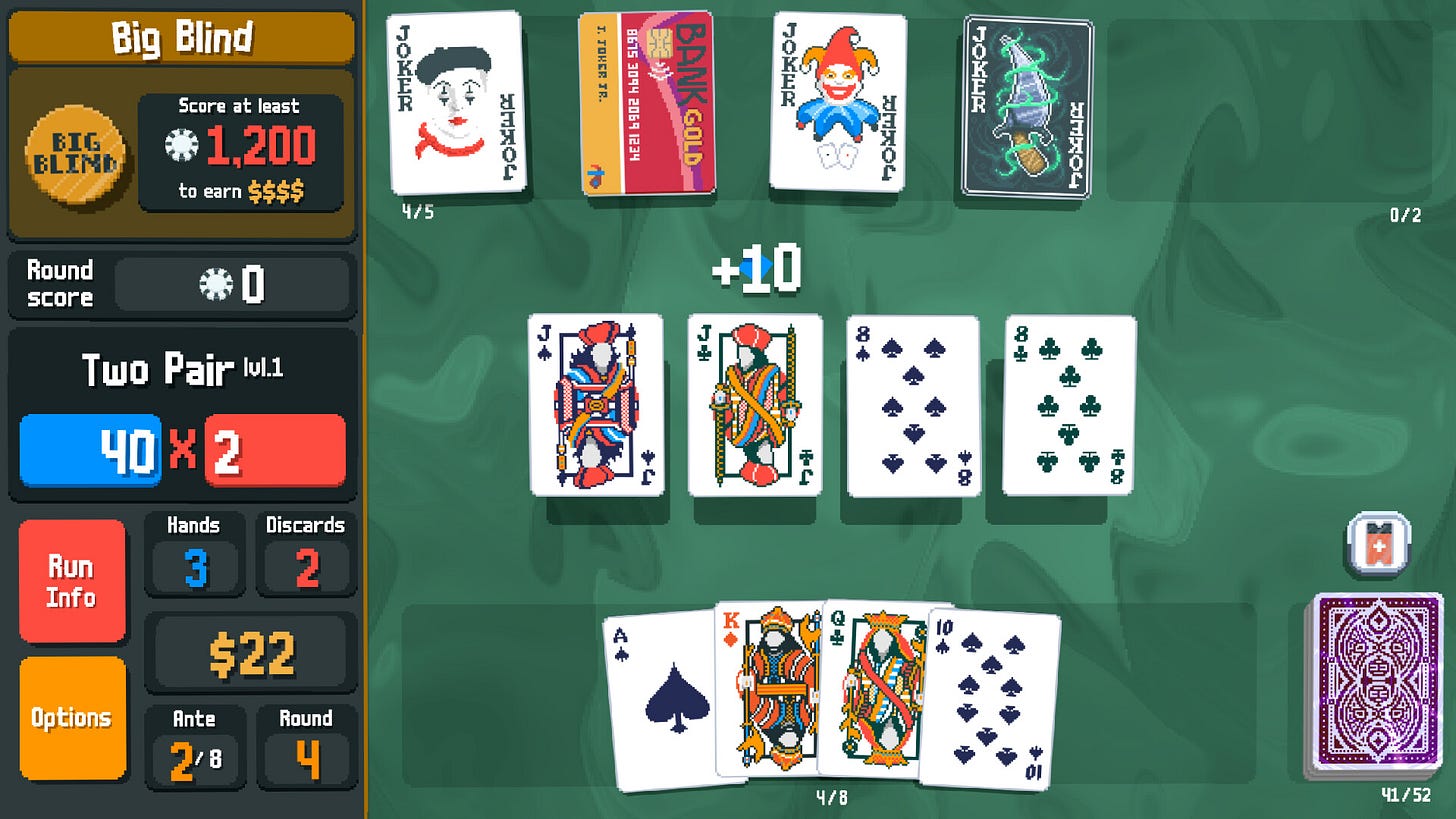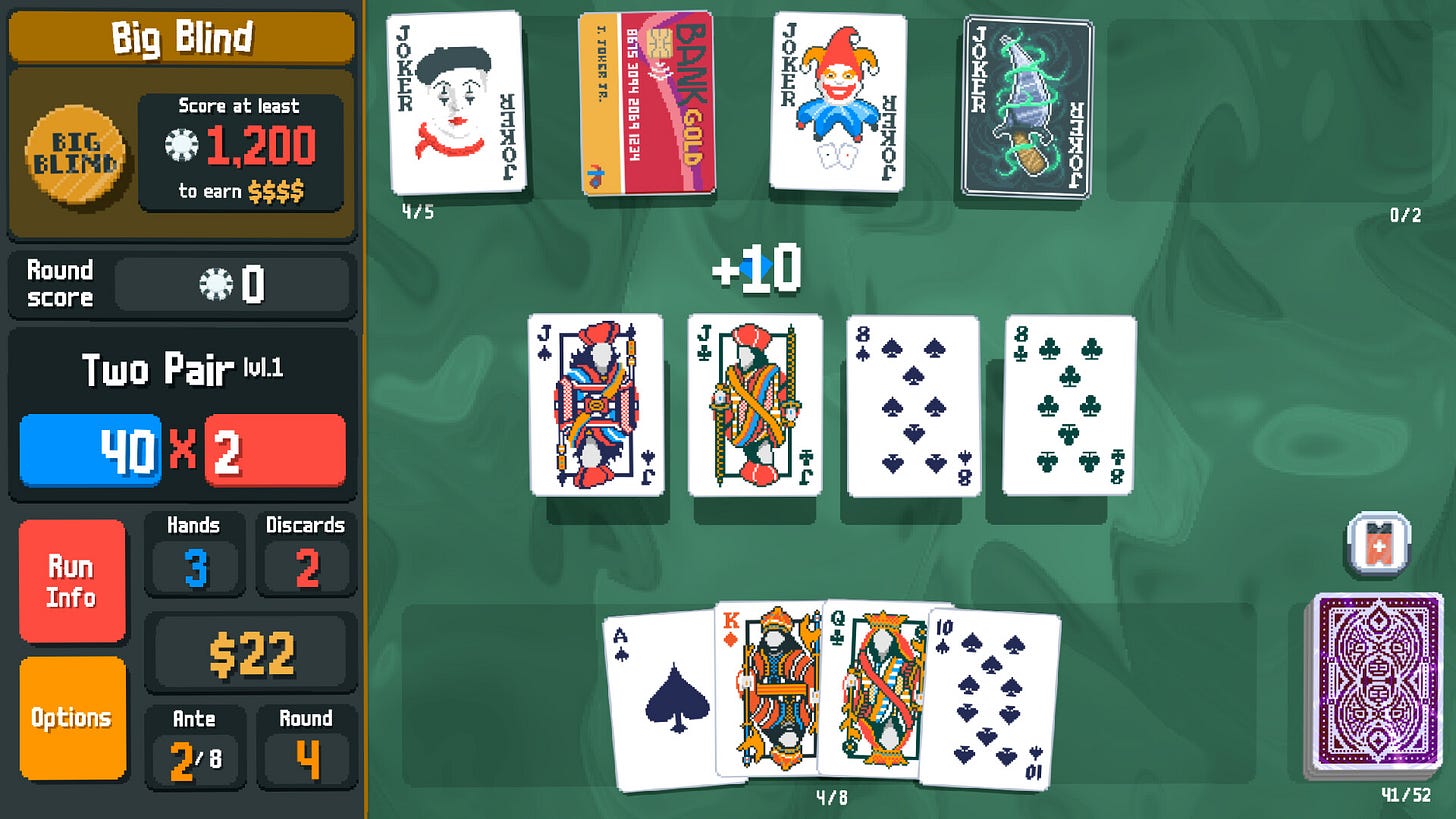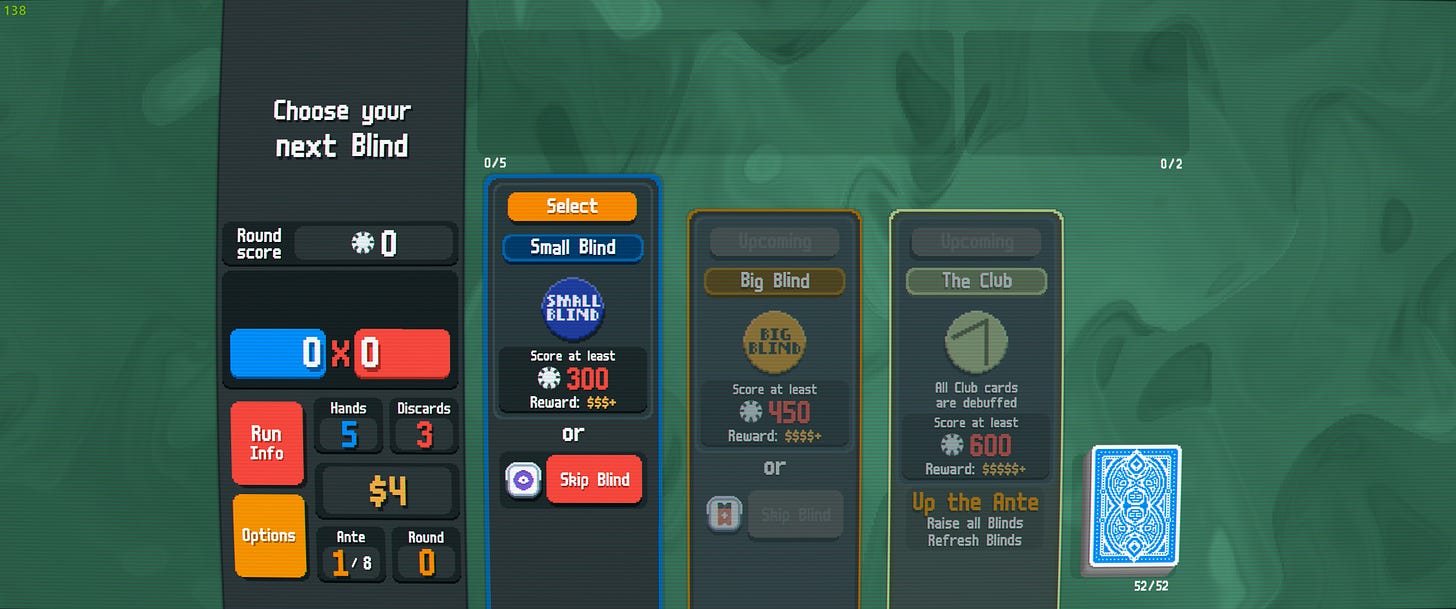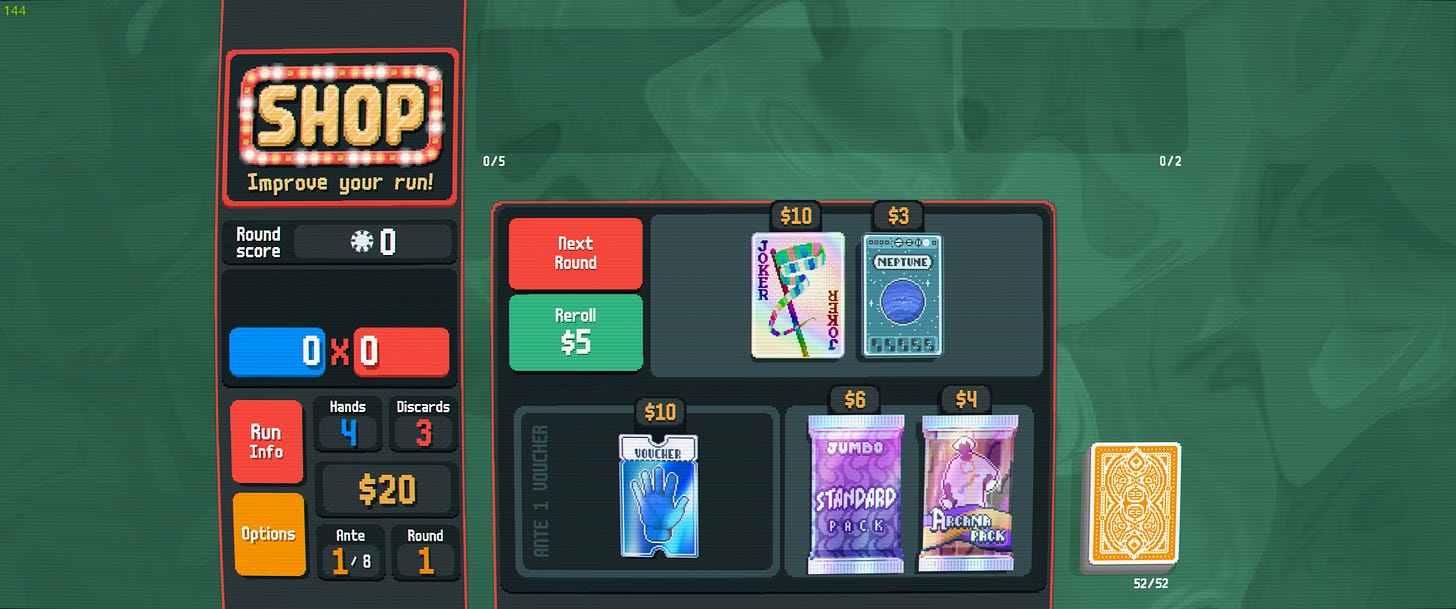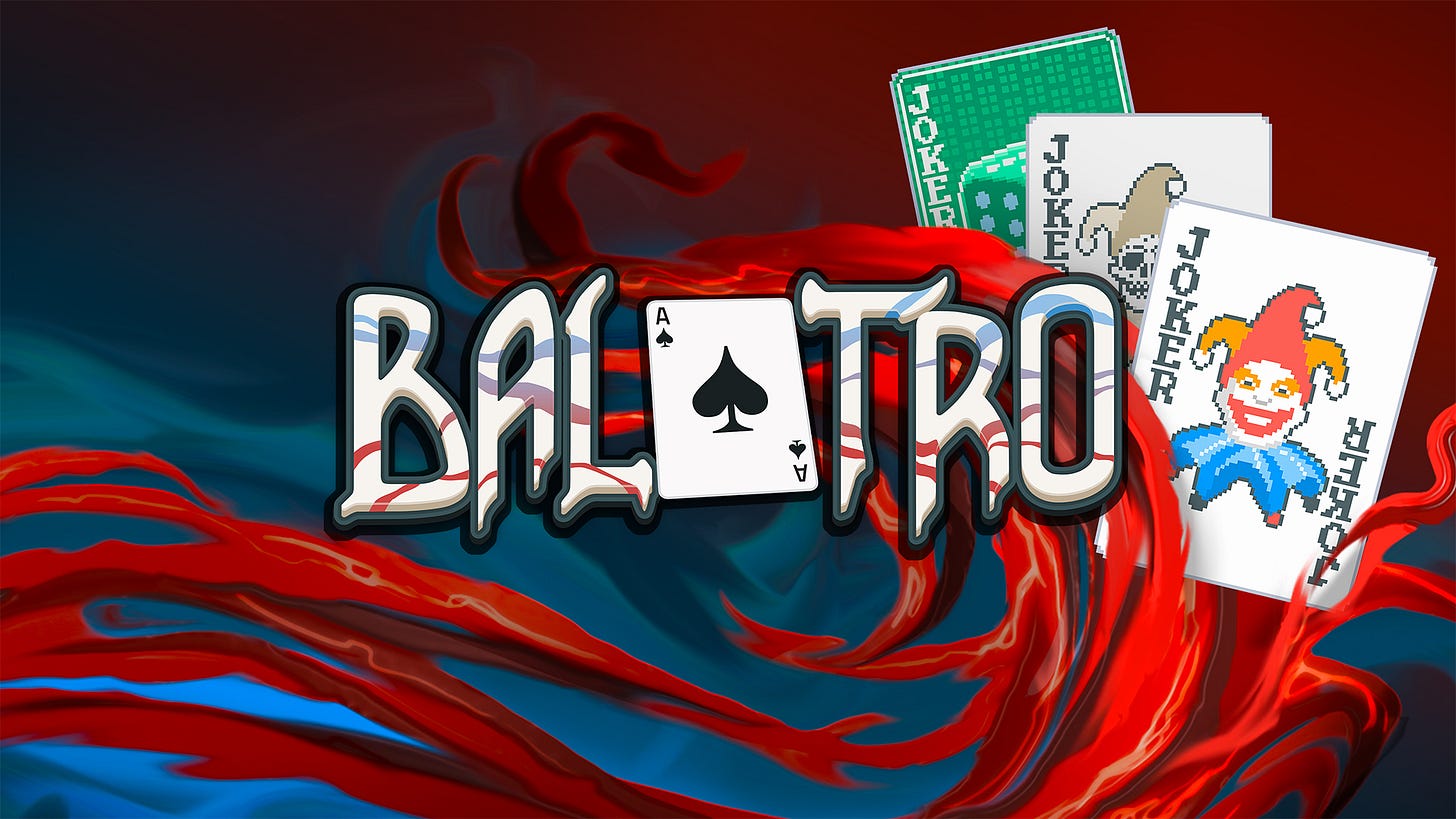Balatro
The roguelike of the year has already been decided.
If you had asked me a month ago about Balatro, I would have had no clue what it was. Now,less than a week after its release I have already sunk in twenty hours without sign of stopping. It had no huge marketing campaign, no hype machine, and no viral social media posts. Despite that, it has seemed to force its way into the spotlight, garnering critical and commercial success. How? The answer may sound hyperbolic, but the way it’s achieved all of this success is by being one of the best indie roguelikes (and maybe roguelikes in general) ever made.
Balatro is all about creating Poker hands. When you think about it, it’s a concept that’s simultaneously simple and genius. It strips down all of the complexity that comes with competing and scheming against other degenerate gamblers and retains only the core ranking logic of the game. Relying on this time-tested and balanced foundation for scoring allows the rest of the game to run wild with modifiers that serve as stewards for unique deck builds.
Because the core gameplay loop is so essential to any great roguelike, I can’t think of any better way to break down the beauty of this game than walking through what a typical round of Balatro looks like.
Every level (called Antes) consists of three rounds: two standard rounds where you must target score, and a final boss round that adds a difficulty modifier to make things a little more challenging. Just analyzing the scene of each ante is a game of strategy in itself. You immediately start making decisions based on the information in front of you. Both of the first two rounds can be skipped, which means you forgo the designated payout you could have won and used to buy more cards for your deck, but skipping also means that you can get a specific tag bonus that could be invaluable down the road. I’ve spent far more time than I would like to admit just sitting on the level select screen, weighing the opportunity cost of accelerating my showdown with the boss for a tag that may or may not leave me in a better place.
Once you’ve decided to skip or play, you’ll eventually be thrust into a game. To aid you in your game planning, you are given a list of all the possible Poker hands you can play, along with their scoring values, as well as a running tally of what types of cards remain in your deck. Equipped with a certain number of discards, you can now use these resources to help you strategize on how to build the highest-scoring hands possible based on your meta. Using unique playing cards and Jokers you bought in the shop can create monstrous multipliers that will set the scoring meter ablaze and rocket you to victory. It’s not a cool walk in the park,k though; you often need to put your faith in the heart of the cards. You’ll become the world’s most adept statistician as you calculate the probability that you’ll get the card that can help you complete your Two Pair, Flush, Straight, or whatever hand you depend on most. It’s a game where you completely control the pace, but that doesn’t make it any less exhilarating as you’re sweating in fear of your running total not hitting that target score. No worries, though; eventually, you’ll win, get paid, and get to take a trip to the shop.
The shop serves as the end and the beginning of this ouroboros, depending on how you look at it. There, you are faced with the classic roguelike decisions of picking your modifiers and building out your deck. You are presented with Jokers, which are constant game modifiers, planetary cards that level up the value of certain hands, tarot cards that modify existing cards in your deck, playing cards to add to the deck, and spectral cards, which usually give you some rate enhancement. Looking at all the options, it’s easy to dream up builds as far as the eye can see. You’ll find yourself poring over every card to figure out what seems most promising, and when you finally make a decision, it just throws fuel on the fire of excitement and feeds this urge compelling you to go out and try out your latest changes.
This is the incredibly satisfying loop of Balatro. Regardless of how many times you win or lose, this loop will pull you back in. There is always something new to try. Maybe you want to try a Flush deck built around a Joker card that reduces all cards to one of two suits, or a Face deck built around the Joker card that counts every card as a Face card, or maybe you want to stack 10 planetary upgrades on your Two Pair multiplier. It doesn’t end at your card meta either. As you play more of the game, you also unlock starting decks that have special properties, endless modes, and challenge modifiers.
After experiencing this loop hundreds of times, I think I understand why it works so well. It’s because, unlike most roguelikes, the purpose is not to beat a curated set of baddies; it’s about seeing how fast you can evolve your understanding of the game. Every run, you have a chance of making it all the way. There are no enemies; you need several runs to learn, and no AI opponents are adapting and countering your playstyle. I’m not saying these things are bad, but they are intentionally exhausting. Balatro is an exercise of the mind. Sure, RNG can put you in a pickle sometimes, but for the most part, if you scheme well enough, you can overcome any challenge put in front of you. When you lose, you know that you have a chance if you just think about things differently next time. The fact that you can almost always see a path to victory serves as a carrot on a stick that will keep you playing for hours at a time.
I know I’ve just been gushing about this game for several paragraphs, but as of now, I don’t have any major complaints. Sure, maybe there could be a bigger selection of starter decks to build from, maybe the little Joker character that talks to you could play a bigger part in the game, or maybe there could be a fun story thread on top of the game. I could go on and on about nice-to-haves, but the truth is the game doesn’t feel like it’s missing anything.
Balatro has achieved a rare feat in gaming and gotten out of its own way. It knows exactly what it wants to do and leans heavily into that. It features a charming yet simple art style that I can’t ever see going out of style. Similar to a game like Solitaire, the gameplay beckons you toward experimentation as opposed to conquering, meaning that regardless of how many times you win, you want to play more. And maybe most importantly, the game doesn’t put much pressure on you. It’s cathartic. You aren’t busting your thumbs trying to survive the 50th boss room with difficulty modifiers maxed out, you aren’t racing to beat some clock that’s setting the pace for you, you’re taking your time, matching symbols, and pairing up numbers. This might be the high coming off of a great game, but several years down the line, I think Balatro will prove to be one that can withstand the test of time. I can’t recommend buying it enough.
P.S. - We need an official Balatro deck to buy as merch, please and thank you.


